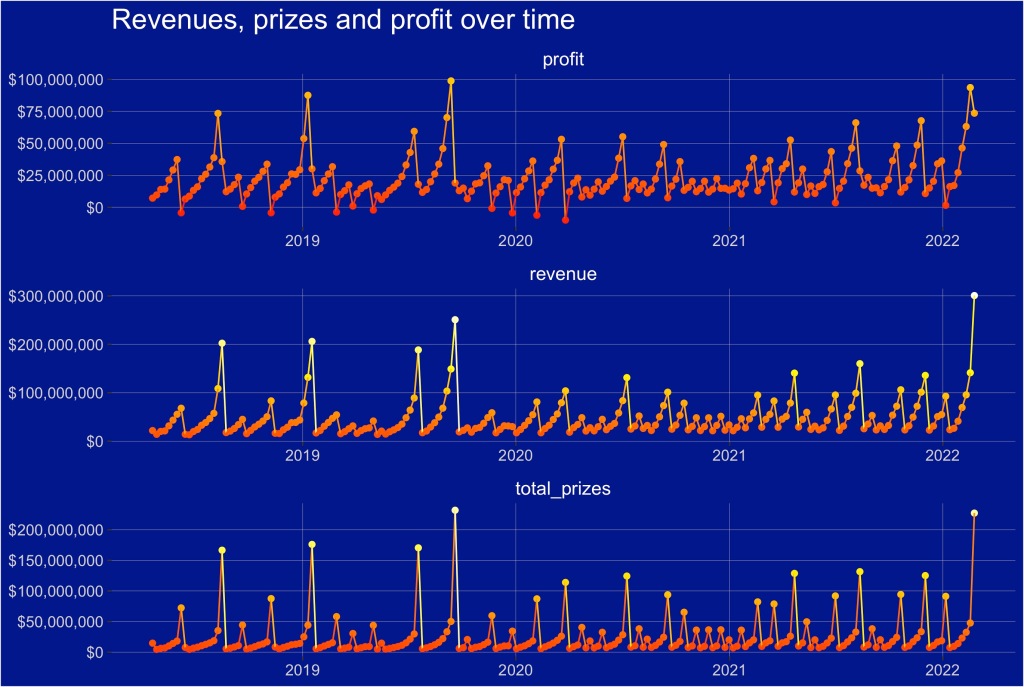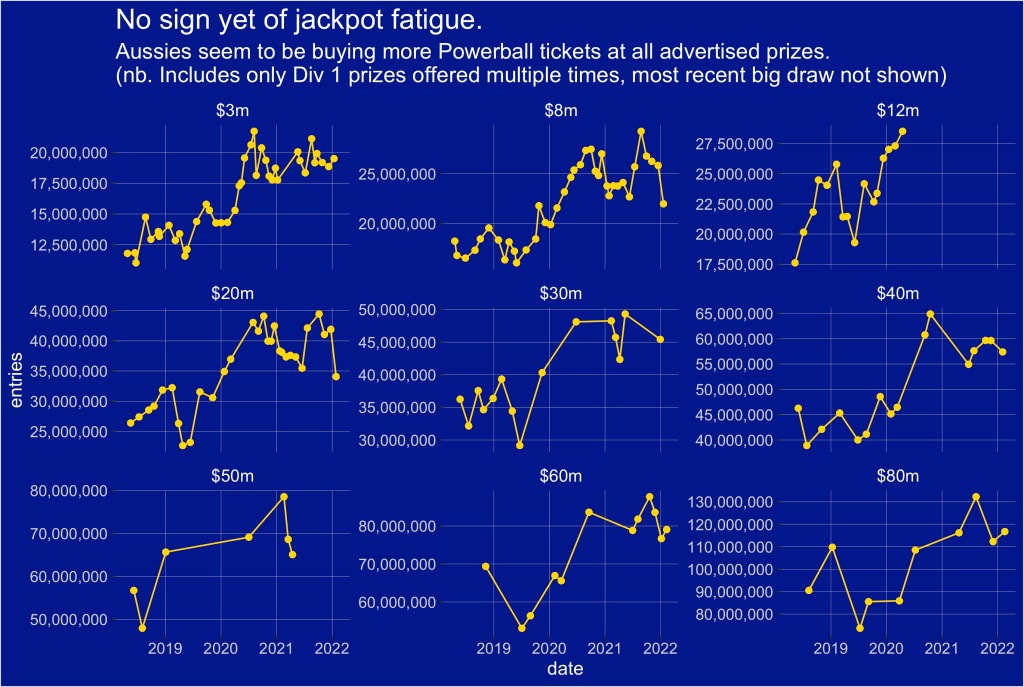Last week Powerball rose to a very rare $120 million Division One jackpot, and I wrote a post about why such jackpots seem so tempting but turn out so frustrating. It turned into one of the most popular posts in the 13-year history of this blog and readers told me they loved it. I was delighted.
If you would like to read it the link is here. The spoiler is big jackpots are not so great because so many people buy tickets. Even if you win, you’ve got a bigger and bigger chance of sharing the jackpot with others.
I published my post on Tuesday and the draw was on Thursday night. It might have been a popular post but it had absolutely zero effect in dissuading ticket sales! In fact, Powerball managed to sell more tickets for last Thursday’s draw than they had ever sold for any draw before. I had a model that said they would sell 175 million tickets. Instead they sold 250 million tickets. The next graph shows how far out of the usual pattern it was.

We had very little data on how many tickets would be sold for such a large jackpot. Last week I was cautious about saying there might be a non-linear relationship between ticket sales and the jackpot size. Today I can say for sure. There is one. Imagine a straight line through those yellow dots – it would go nowhere near the red one. People go absolutely bananas for a big prize.
Because so many people bought tickets (far more tickets than there are unique combinations), two people held the same winning numbers. The prize was split with the two winners each taking home over $60 million. The prize pool was greater than the advertised $120 million because so many people bought tickets and Powerball is obliged by law to give back 60 per cent of takings, so they bumped up the Division One Prize Pool to $126 million.
The amount of revenue from the most recent draw is a record: $300 million. But as you can see in the next chart, the most recent draw was not the most profitable. It is usually the penultimate draw before the jackpot that makes the lottery company the most money.

You can also see from this chart that they do sometimes lose money on the big jackpots. In particular, four consecutive big jackpots in 2020 were money-losers. Ticket sales were no doubt disrupted at that point thanks to the pandemic and national lockdown. However, no draws since early 2020 have been money-losers. We will explain why in a second, but first lets talk about where the profits go.
The profits of Powerball look too good to be true, right? In a way that’s right. Tabcorp does not keep all the money. The government benefits in several ways. For example, state lottery taxes in the state of Victoria take 90 per cent of what is lost (tax is slightly lower if tickets attract GST). That leaves the lottery company with the sliver between the red and green lines . One reason not to feel bad about buying Powerball and losing is you help fund our health system!

The real money-making weeks for Lottery companies (and their regulators!) are the ones just before a jackpot goes off. When the Division One jackpot does not go off, profits rise in a simple, predictable and very steep line, as shown by the triangles in the next graph. Weeks when the Division One Prize goes off are much less profitable.

This is probably why Tabcorp is eager to make lotteries harder to win. The data I’m using for Powerball goes back to 2018. The reason I haven’t gone back further is because prior to that, Powerball had fewer balls to choose and fewer divisions to win. They changed the rules of the game in 2018, creating Division Nine – which was easier to win – while Division One became much harder to win. The intent was creating fewer Division One wins and more jackpots.
Tabcorp is now planning to do the same to Oz Lotto, which is, like Powerball, a jackpotting lottery. Unlike Powerball, Oz Lotto is drawn on Tuesday nights and has a yellow colour scheme instead of purple. They are very different.
“We will also introduce a change to Oz Lotto that is expected to create larger and more frequent jackpots in line with its promise to deliver ‘Big Aussie Fun’,”
Tabcorp boss David Attenborough, speaking last week. (No, not that David Attenborough!)
The changes will make Division 1 “more likely to jackpot (c.40% more combinations)” Tabcorp say in their recent investor presentation. (pdf at link).
Powerball is Tabcorp’s most popular lottery, so attempts to make Oz Lotto more similar make sense for them.
In fact, the popularity of Powerball has been surging over time. This may explain why draws have been so profitable recently – and also why so many people bought tickets last week. There are more powerball players now than previously. Tickets sold each week have risen a lot, and they rose especially during 2020. People were stuck home and bored and had, thanks to the various fiscal supports, money to burn.

The yellow lines go up, but then they seem to stall a bit. Hot demand for low levels of Powerball may have cooled in 2021-22, which is a tantalising explanation for why the jackpot rose so high recently. A climate with fewer ticket buyers lets the jackpot rise.
It’s a paradox that the more people pile in to the low levels of Powerball, (e.g. selling 45,000 tickets for a $20 million Division One prize pool instead of a mere 25,000 tickets) the lower the chance of the prize rising to a level where Powerball might sell 250 million tickets. And make no mistake, they like those long sequences of jackpots. Once they’ve made OzLotto harder to win, Tabcorp might be tempted to come back to Powerball and do the same thing to it.
This is Part Two in my series on Powerball, on Profit. Part One is here, on Naivety.
Part Three is about Strategy. It is coming soon and concerns the burning question of whether you can do better by choosing numbers other people aren’t choosing (yes you can, and I will demonstrate a way to work out what those numbers are. )
One thought on “How to make money from Powerball (hint: sell the tickets, don’t buy them)”